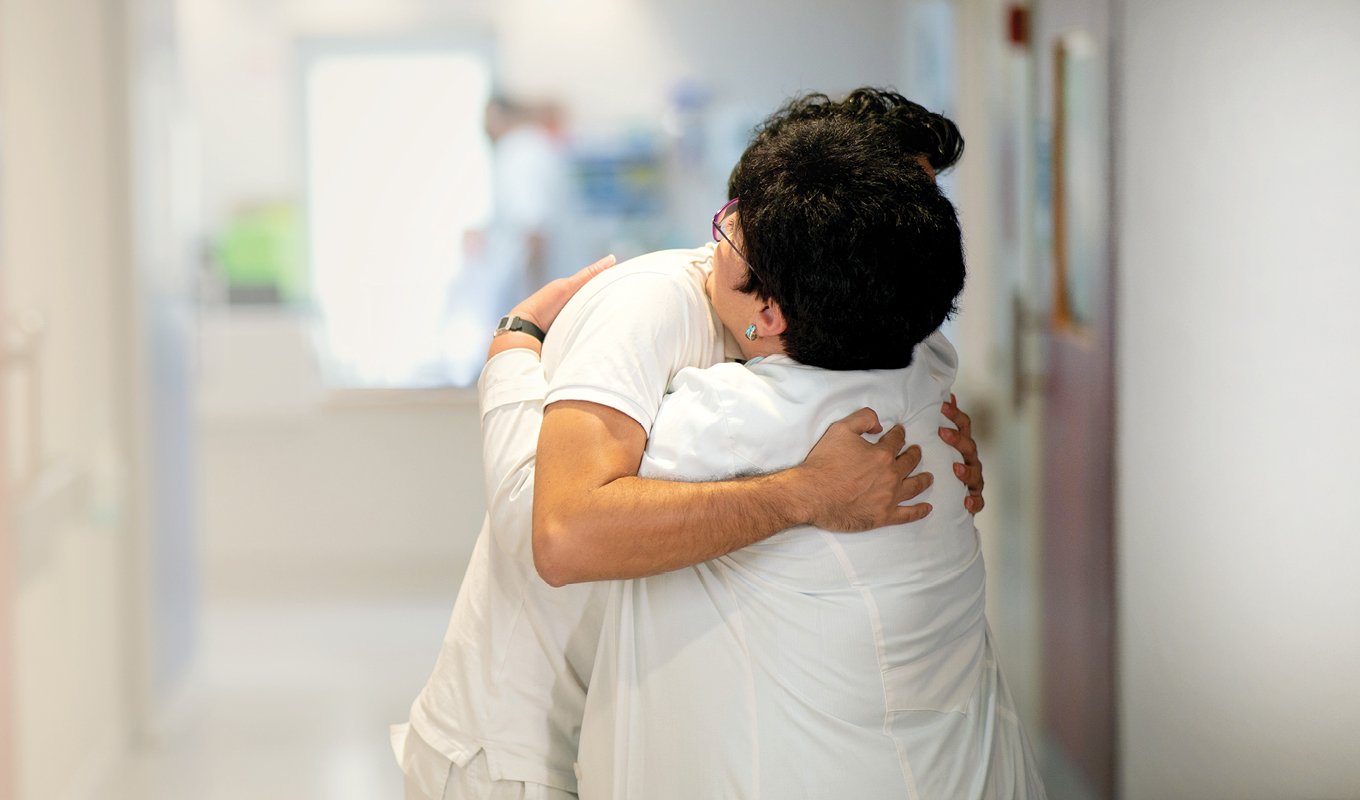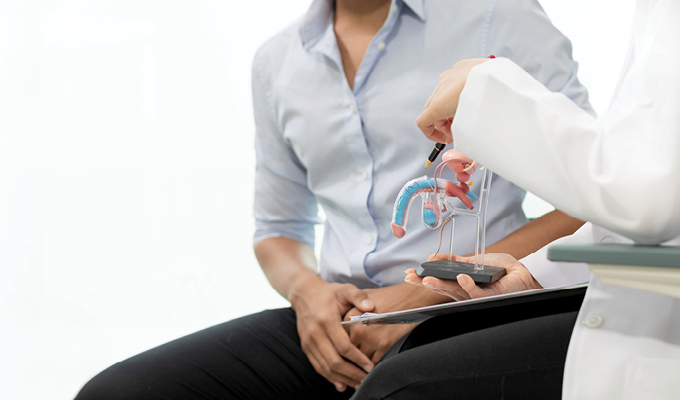Benjamin Reubinoff, M.D., Ph.D., has been the Chief Scientific Officer at Cell Cure Neurosciences Ltd. since 2006 and serves as Director of the Hadassah Human Embryonic Stem Cell Research Center. Additionally, he is a Senior Physician at the Department of Obstetrics and Gynecology at the Hadassah University Medical Center in Jerusalem and one of the pioneers of hESC research. He serves as a Member of Scientific Advisory Board at Kadimastem Ltd. Prof. Reubinoff is a full Professor of Obstetrics and Gynecology and serves as Chairman of the Department of Obstetrics and Gynecology. He completed his residency in Obstetrics and Gynecology at the Hadassah Medical Center. Prof Reubinoff also holds a PhD degree in developmental biology from Monash University, Melbourne, Australia.
For more information about Benjamin Reubinoff, M.D., Ph.D.
The Israeli Breakthrough that will Prevent Blindness in the Elderly
Hadassah Stem Cell Pioneer Singled Out for Clinical Success
Breakthrough Could Help Treat Degenerative Diseases
Transcription:
Melanie Cole (Host): This is part two of our two part series with Professor Benjamin Reubinoff, world-renowned stem cell pioneer and Director of Hadassah Human Embryonic Stem Cell Research Center, on this episode of Hadassah on Call.
Melanie: Professor Reubinoff, What do you see are some obstacles that must be overcome before some of these potential uses can be realized? Are there regulations? With embryonic, it's so amazing, but what's going on in the world that might preclude some of this research?
Professor Reubinoff: Indeed, it is a big challenge to develop embryonic stem cells from the stage of the research – laboratory research, basic research, to clinical application. Actually, in the last twenty years, we have been going in this roadmap towards developing human embryonic stem cells to clinical application, so the first step in this path is developing stem cells that will be usable in clinical applications. What does that mean? It means that you have to derive stem cells from embryos under specific conditions which are highly sterile and highly monitored to develop stem cells that can be used from the quality point of view in transplantation in human beings. At Hadassah, we have been pioneers in developing these types of stem cells, which we call clinical-grade stem cells, and we develop them under very specific conditions without the use of any animal-derived product, so that they will be suitable for transplantation and to serve as the starting material – the stem cells – the primitive stem cells – the starting cells – for further development of specialized cells that can be transplanted. This is the first step to develop clinical grade, new stem cells, and we are providing these stem cells that we developed to other groups worldwide that are developing specialized cells for clinical applications.
The second step is to of course to develop the methodology to direct the maturation of the stem cells into one type of mature cell. You need to be able to direct the maturation into a population that will include only one type of cell and will not include other types of cells. Why is this a challenge? Because the stem cells will spontaneously give rise to multiple types of cells in the human body. This is their role in the development, and this is what they tend to do. You need to develop the techniques and methodology to control this process of maturation of stem cells and to be able to direct them to become a single type of cell, whether it will be a nerve cell or whether it will be a retinal cell or a pancreatic cell. This is a very big challenge.
Once this is overcome, you have to prove that the pure population of mature cells that you obtained is safe. When you transplant them, you do it of course, in animal models initially to show that these cells are safe in the animal model and to show that they have a therapeutic function in the specific animal model that is relevant to the disease. This is also a very big challenge.
Once all of this is done, of course, you have to present it to the regulatory agencies, like the FDA or in Israel, it's the Ministry of Health of Israel, and to show them all the data and to get their approval to move to patients. This is actually the process, and we have been following this process. We have focused – at Hadassah, initially, on developing cells for transplantation in retinal degeneration and more specifically, the disease, which is called age-related macular degeneration.
Age-related macular degeneration is the most common reason for blindness in the elderly population in the western world. There are really millions of patients that are suffering from this condition. It is related to the malfunctioning and death of specific cells in the retina, which are called the pigmented cells of the retina. As these cells are dying, the patients gradually lose their vision. Unfortunately, today, there is no treatment that can halt the progression of the vision loss and the progression of the disease. We hope that if we replace the malfunctioning and dying pigmented cells of the retina of the patients by the same retinal pigmented cells that we derived from the stem cells, we can at least halt the progression of vision loss. If we do it early enough, the patients will have their vision sustained, and they will not lose their vision, and we can prevent the progression of this devastating disease and prevent blindness of a patient.
This has been our focus in the last fifteen years. The whole project of developing of the hESC for transplantation in retinal degeneration diseases was developed in tight collaboration with Prof Eyal Banin and his team from the Department of Ophthalmology at Hadassah. We went through the path that I described before, and we received approval from regulatory agencies, both the FDA and the Ministry of Health in Israel -- and we initiated by a startup company that we established for this purpose – Neurosciences, a clinical trial in AMD patients and we transplanted quite a few patients so far. The main goal of these early clinical trials is mainly safety. We need to show as a first step that transplantation of these pigmented cells of the retina that we generated is safe and does not cause any complications. This is the main goal of this current trial, and initial patients that are being transplanted are legally blind, so we want to make sure that we transplant into patients that can't really lose much if there will be a significant complication. So far, the trial is going very well, and in the next group of patients that we are going to transplant, these patients will have better vision. We also hope that we will be able to show some functional effect of the transplanted cell.
Melanie: Absolutely fascinating, Professor Reubinoff. Do you think -- as complex as these situations are that you have been describing and the regulatory way that stem cells have to go through to be approved – do you think that sometimes their current applications are a little exaggerated by the media or other parties who don't fully understand the science or the current limitations that you have to go through or some clinics that are looking to capitalize on some of this stem cell hype by selling treatments to chronically ill or seriously ill patients, do you think that there is an issue with this at all?
Professor Reubinoff: Yes, so I think that we need to be very careful and I think that you have mentioned there are some clinics that are offering various stem cell treatments. I think people have to be very careful and examine proposals for stem cell therapies very carefully and to make sure that these offers for therapies are substantiated by a hard – correct clinical data by regulatory approvals and so forth. This is a big problem and problematic issue in the field of stem cell therapy and developing a treatment that is based on stem cells is a complex process that I have described, and it requires a lot of investments both of scientific expertise, time, and financial support. I think that the main point is that the people that are seeking stem cell therapies should really be careful and to look deeply into any such offer. There are just very few clinical trials with pluripotent stem cells or embryonic stem cells that are ongoing at the moment, and they are mainly focused on safety, as I have mentioned. On the other hand, around the globe, there are quite a few suggestions for a clinical transplantation of stem cells where I am not sure that these offers are based on hard data that support these offers, so it's very important to be very careful when someone is looking into such a trial or such a treatment.
Melanie: Professor Reubinoff, in summary, what does current research indicate for future developments and treatments? Give us a little blueprint for future research and your best advice.
Professor Reubinoff: I think that, as I mentioned before, the field of pluripotent stem cells and embryonic stem cells is at this stage today, that it is in early stages of very few clinical trials and there are other few groups that are preparing themselves toward initiating clinical trials. As I mentioned, the focus of these trials at the moment is safety. The vision, for the next, I would say five or ten years, would be that these clinical trials will continue and will show a function – of course after showing safety. We will get data that will support the safety and will also show the function of stem cells in a few candidate conditions that are ongoing at the moment, including Parkinson's Disease, diabetes, retinal degeneration, as well as heart failure, and the vision is really that we will see a functional effect and eventually, we will have stem cell therapies as off the shelf therapies that will be offered to the million patients in need. I think that we are in a very exciting period at the moment where stem cell therapy – embryonic stem cell therapy is entering the clinic, and we have a very exciting few years ahead of us where we really hope that we will be able to get the stem cells to become a therapy that will be available to these conditions where there isn't any other effective therapy at the moment.
Melanie: Thank you so much, Professor Reubinoff, for being with us today and for all of the unbelievably amazing work that you're doing. This is Hadassah On Call, New Frontiers in Medicine, brought to you by Hadassah, The Women's Zionist Organization of America. The largest Jewish Women's' Organization in America, Hadassah enhances the health of people worldwide through medical education, care, and research innovations at the Hadassah Medical Organization. For more information on the latest advances in medicine, you can go to Hadassah.org, and to hear more episodes in this podcast series, please visit Hadassah.org/podcasts, that's Hadassah.org/podcasts. This is Melanie Cole. Thanks so much, for listening
We'd love to know your thoughts, questions, and stories! Send us an email anytime at marketing@hadassah.org.



.svg)


